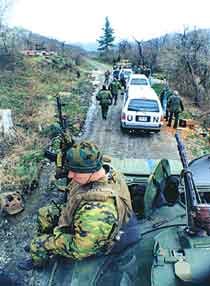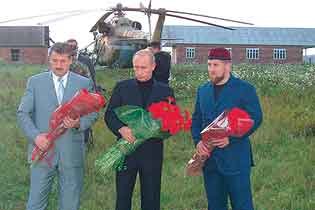Pendulum of ethnic communities’ political activity
The post-Soviet history of Russia could be divided into two stages. The first one, the tenure of President Boris Yeltsin is often called the “epoch of revolution.” The second stage, which started when Vladimir Putin factually came to power, with some reservation could be called the “epoch of stabilization.” From the viewpoint of ethnic policy these two periods have a clear distinction: activity of ethnic minorities were replaced by activity of the ethnic majority. In my scientific publications I call this phenomenon an effect of “ethnopolitical pendulum.”
Its first cycle — the rise in activity of ethnic minorities — was registered from 1990 to 1993. It was marked by the so-called “parade of sovereignties,” ethnic conflicts and even cases of their expansion beyond the borders of the Russian Federation, such as for instance the involvement of the Confederation of the Caucasus Peoples in the war in Georgia’s Abkhazia. All this was associated with the performance of national movements of ethnic minorities. However, by the middle of the 1990s it became obvious that these activities were on the decline. On the contrary, Russia’s ethnic majority remained passive in the “epoch of revolution” and raised its voice only in the “epoch of stabilization.”
The second cycle — the ethnopolitical activeness of the Russian majority — started to reveal from the middle of the 1990s and enhanced by the beginning of the 2000s. According to a survey published by the All-Russian Center for Public Opinion Studies (VTsIOM) the share of people who approve of the “Russia for Russians” slogan partly or in full increased from 45% in 1998 up to 55% in 2002 mainly among the Russians (75% of the polled). People of other nationalities showed total rejection of the idea — 59% of them branded it as “a true fascism.”
In my opinion, “stabilization” in the ethnopolitical sphere reveals only through new forms of activity. For that reason alone any new phenomenon remains invisible to the majority of the population as well as to the authorities. The subject of ethnopolitcial tensions changed. In the “epoch of political stabilization” the threat of ethnic separatism reduced considerably. Only some parts of the rebel Chechnya proclaimed open separatism. But latent tensions were on the rise. Xenophobia increased almost two-fold and, which was more dangerous, the strength of extremist organizations grew dramatically. Among organizations operating under the slogan “Russia for Russians” skinheads increased their number from dozens in the 1990s up to more than 30,000 by 2004.
Anxiety and xenophobia growing among representatives of the ethnic majority might well cause an adequate response from ethnic minorities. In this case the ethnopolitical pendulum will make the third and final cycle that might end in a ruinous crisis of the state system.
 |
Pendulum of political strategies
The ethnopolitical pendulum is set into motion by the momentum of ethnopolitical processes. However its amplitude in a long run depends on the effect of political decisions. Meanwhile, ethnic policy of the two presidents was and remains “reactive” i.e. responding to this or that current challenge and not taking into account strategic aftereffects. During the “Yeltsin epoch,” when only voices of ethnic minorities or to say more precisely of their leaders were heard, the formula “take as mush sovereignty as you can carry” determined the state policy. In the “Putin epoch” political forces speaking on behalf of the ethnic majority call the tune. Their response to the minorities’ challenge was the policy limiting rights of regional and especially ethic elite and a bill “On the Russian people” submitted to the State Duma. The bill boils down to a proposal to recognize that the ethnic majority is a “state-forming people.”
The bill is merely declarative and this is its principal imperfection. It will be unable to bring anything useful to the ethnic majority but instead might broaden the ethnic split. If we recognize one people as “state-forming” what is about other peoples who for centuries have been leaving on the territory of the Russian Federation? Moreover, if Russia has its “main” people then eventually all its ethnic republics (renamed into provinces or not) will inevitably have “main” peoples of their own. And instead of strengthening the unity of the nation we will have another spiral of ethnic disintegration.
When the government sides with or limits interests of some ethnic groups it enhances the amplitude of the ethnopolitical pendulum and its initiatives are rejected by freshly consolidated groups that believe they have been deprived of the government’s care.
 |
Ethnopolitical declarations and real policy
Russia has all political and legal grounds to shape out its ethnic policy as a strategy designed to consolidate the society. In his latest state-of-the-nation report to the Federal Assembly President Vladimir Putin for the first time called Russia’s citizens “one nation.” The 1993 Constitution earlier defined Russia’s integration formula in the following words. “The bearer of sovereignty and the only source of power in the Russian Federation shall be its multinational people.” However, unfortunately we see the broadening gap between proper words, good declarations and improper political practice. There are numerous examples how the state policy swung, albeit unwillingly, the ethnopolitical pendulum, how reforms intended for good and apparently aimed at political stabilization and strengthening of the nation’s integrity led to diametrically opposite results right because ethnic communities rejected or even opposed them.
State administrative decisions could cause protest and even resistance of the mass ethnic conscience if it perceives them as a threat to the basic ethnic symbols such as language, “historical territory,” self-administration etc. The announced policy of “Russia’s re-centralization” designed to restore the so-called “vertical of power” might serve a bright example. In my opinion, this policy clearly fails to yield the hoped-for stabilization of the ethnopolitical situation.
I should mention just one initiative in the framework of this reform — the transition from election to appointment of governors. By the way, the proposed technique practically does not differ from that defined by the Constitution as “the appointment” of the head of the Russian Government. Legal aspects of the problem are broadly discussed today, but I rather center on some of its ethnopolitical aspects.
They say, “people don’t care whether governors will be elected or appointed.” I cannot agree. Which people do you mean? Among the peoples of the North Caucasus elections are a strong tradition and an essential part of everyday life. They elect everybody from a “tamada” head of the table to village authorities and from a mufti to the head of a local “jamaat” Wahhabi grouping. Presidential and czarist governor-generals often had here merely symbolical authority. Real power always belonged to informal elected leaders. And the bigger the gap between formal and real authorities the greater is a possibility of management collapse and bitter confrontation in this given area.
The ethnic elite started growing rapidly already in the Soviet era. After the collapse of the Soviet Union this growth became more evident as plus to managers and intelligentsia the elite started to incorporate businessmen and clerics. Those who say this elite will automatically dissolve when we send them governors from Moscow or abolish the very institution of ethnic republics either are too Machiavellian or simply do not understand ethnopolitical processes at all.
In all countries the ruler had always to pay for loyalty of the ethnic elite by its greater participation in government or by its incorporation into prestigious strata. That was the situation in Russia in the middle 1990s when ethnic elite lowered activities everywhere except war-stricken Chechnya. Today this activity is on the rise again boosted exactly by discontent over the authoritarian policy of the Kremlin.
Ethic intelligentsia is not happy with laws coming from Moscow that infringe interests of ethnic cultures (such as a notorious law making Cyrillic the compulsory alphabet for all languages across Russia). Business grumbles under the pressure of corruption (previously officials claimed bribes but today they are looking for a complete takeover). The majority of political elite albeit proclaiming its support to the latest presidential initiatives (they are vastly Kremlin-dependent already today) nurses its grievance. In this situation the informal elite is rapidly strengthening its positions. It is difficult to make them accept new laws but it is very easy to provoke a new spiral of resistance and make them consolidate before a common enemy.
 |
Processes in Islamic organizations need a separate attention. While more representatives of traditional Islam come close to power we see the growing popularity of new for this country branches of this religion such as Wahhabism viewed and used by many as an efficient form of opposition. (Wahhabism is a form of Salafism, a philosophy that advocates the restoration of the original Islamic faith of the end of the 7th century — Eds.) If the Kremlin names a mufti republican president, his opponents will promptly start inclining towards non-traditional and sometimes radical forms of Islam that are flourishing today in Russia and especially in the North Caucasus. Radical Islam groupings many times displayed their fighting capabilities not only in Chechnya, Dagestan but also in Karachayevo-Cherkessia. Recently they openly emerged even in Kabardino-Balkaria, a republic known for its political tranquility.
The appointment of national leaders does not add to their responsibility before their peoples and it does not add to their responsibility before the Kremlin either. Today it might produce a certain type of an official — a “disposable” one. In case of a failure he might be removed to another region, or “punished” by minister’s chair like former Maritime Territory Governor Nazdratenko or former St. Petersburg Governor Yakovlev. For less than 12 months the latter has been ordered to change al least three ministerial posts. Moreover, the appointment of a regional chief will enhance the tendency under which people address their demands to federal authorities rather than to the regional government. The sovereign has appointed the governor — the sovereign is responsible for his performance. In this situation people might start blaming the president for blackouts in one remotest village. In predominantly one-nation republics this trend might increase anti-Russian moods. Local population views the federal government as “Russian” and treats all its unpleasant initiatives as deliberate discrimination of non-Russians.
So instead of a “vertical of power” we receive a pipe-like construction, through which wrong administrative decisions go down through the weakened regional filters while the flow of popular discontent and suspicions is pumped up.
Presidents come and go but ethnopolitical problems remain because as a rule they preserve moment for long. The ethnopolitical situation in this country and especially the latest trends towards the growing ethnic jealousy adds little optimism. Meanwhile, the aforementioned threats of a new cycle of ethnic conflicts are vastly hypothetical and we have all possibilities to avoid them. If the national economy and civil society develop successfully interethnic relations might normalize to a certain extent. But even under the most optimistic scenario it would be absolutely wrong to hope that the “invisible hand of market economy” or “liberalization” alone could help resolve all interethnic problems. Hence, we shall not postpone the drafting of a state ethnic policy till better opportunities. They might never come.
By Emil PAIN, Head of the Center for the Study of Xenophobia and Extremism under the Russian Academy of Sciences




